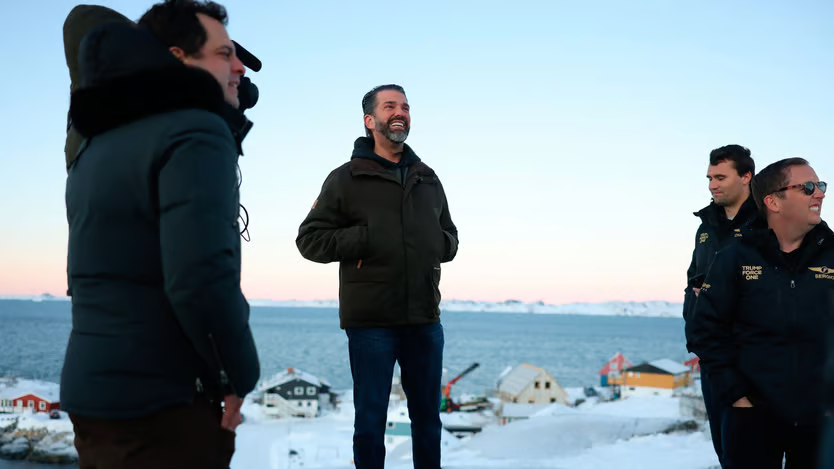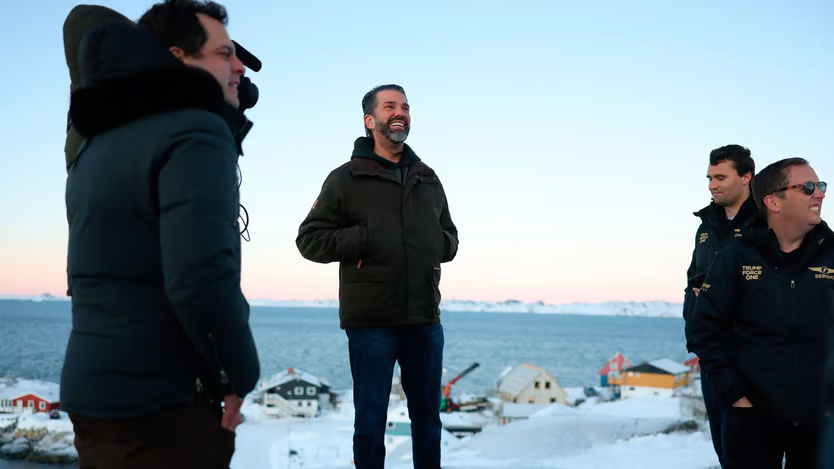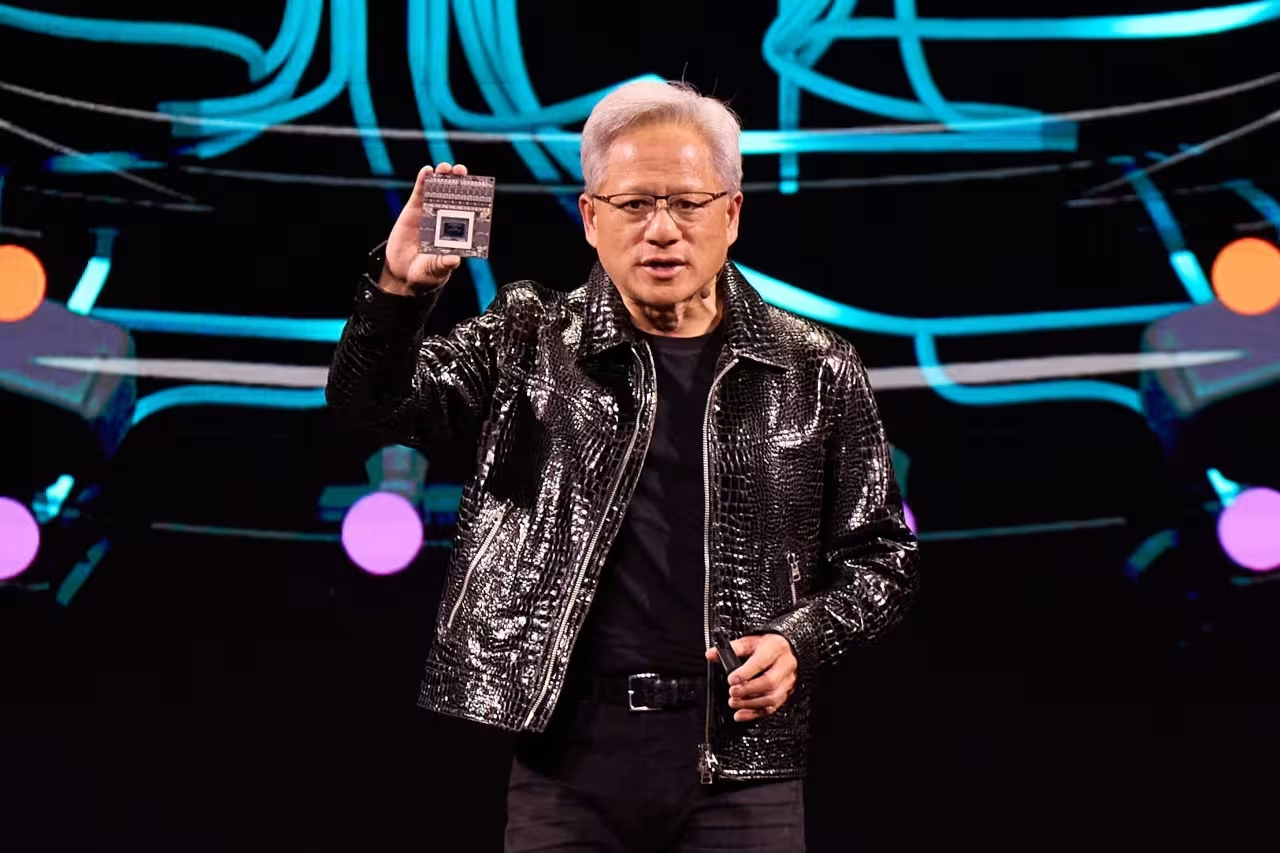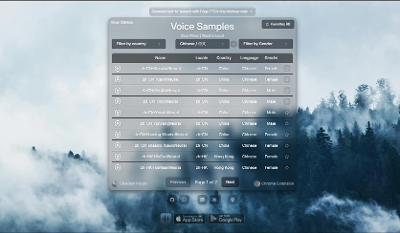
Economist Reading and Analysis 2nd
本文最后更新于 2025-11-10,墨迹未干时,知识正鲜活。随着时间推移,文章部分内容可能需要重新着墨,请您谅解。Contact
What do Greenlanders think of being bought?
-Donald Trump’s desire for Greenland, and a shabby visit by his son, reignite the independence debate
Audio
Original Text

AFTER LANDING in Nuuk, the capital of Greenland, Donald Trump junior sought to take stock of local feelings around his father’s plans to take over the Arctic island. A hotel meeting room in the centre of town was the venue for this putative act of spontaneous and popular assembly. Don Jr’s entourage said it encouraged ordinary Greenlanders from all walks of life—but no journalists or politicians—to drop by for a frank conversation about the issues facing Greenland. In reality, locals say, the dozen or so attendees included homeless people coaxed from across the street with the promise of some MAGA merch and a free meal at one of Nuuk’s nicest restaurants.
The stunt was hardly representative of what Greenlanders really make of Donald Trump’s recent outbursts. In Nuuk, opinions range from apathy to bewilderment to fear. Some are washed over by unease. “He’s scary,” says Ruth, who works at a cultural centre. “We don’t want him here.” She says many Greenlanders take Denmark for granted and that America’s historically poor treatment of indigenous populations in Alaska is a big part of her concern (Greenland’s population is 89% Inuit). Three young construction workers nearby are more amenable to the prospect of American ownership. “It would open economic opportunities for us,” one tells The Economist. “I wouldn’t mind,” smirks another when asked whether he would like an American passport. “But for me it’s always Greenland first.”
Greenlanders say that the past week of global attention has brought the issue of independence back to the fore. The island’s 56,000 people chafe under what they consider a 300 year-old colonial rule from Denmark. In 1979, Greenland was granted broad autonomy, though Denmark retains its power over foreign policy and defence (something Greenlanders are rarely consulted about). According to the most recent opinion poll from 2019, around two-thirds of Greenlanders support independence, but they remain divided over its timing and potential impact on living standards. Danish subsidies keep its economy afloat. They account for over half of the Greenlandic government’s budget and finance much of the island’s employment, health care and education.
Few Greenlanders support an outright American takeover, but some sense an opportunity to leverage Mr Trump’s interest into greater autonomy. American investment in rare-earths mining, for example, could help wean Greenland’s economy from Danish handouts. There is an increasing desire to strike a free trade agreement with America, too. (Greenland left the then-European Community, today’s European Union, in 1985, and hence can strike its own deals.) Mr Trump junior’s high-profile visit to Nuuk might even be a boon for tourism. “It’s an amazing marketing opportunity,” quips a political staffer at the Inatsisartut, Greenland’s parliament.
An opinion survey from December 2024 shows that nearly 60% of the Greenlandic public wants closer co-operation with America. “We are not looking for utopia for Greenland,” says Kuno Fencker, a pro-independence member of parliament. He thinks Greenlandic independence could be buttressed by closer co-operation with the Americans on defence and security. Many Greenlanders feel that Denmark has not done enough to invest in protecting the island. Greenland already hosts an American military base and is seen as critical to Arctic security. Mr Fencker notes that America already has “Compacts of Free Association” agreements with states like Micronesia in the Pacific. An independent Greenland could strike a “double compact of association” with both Denmark and America, he suggests. Iceland is another model many Greenlanders aspire to.
At a press conference in Copenhagen on Friday, Múte Egede, the island’s pro-independence premier, reaffirmed that Greenland was not for sale. “We don’t want to be Danes. We don’t want to be Americans. We want to be Greenlanders,” he told reporters. A general election is due in April for Greenland’s 31-member parliament. The question of independence was anyway going to be front and centre, and now it will be even more so. Greenlanders often complain that for too long they have been ignored over the issues that affect their future. This year, in some part thanks to Mr Trump, that looks likely to change. ■
Analysis
1. Donald Trump Jr.'s Visit to Nuuk
- Purpose vs. Reality: Trump Jr. held a meeting in a hotel room in Nuuk, presenting it as an informal gathering for the common Greenlanders to discuss the island's challenges. The event was marketed as a spontaneous opportunity for open dialogue. However, in reality, only about a dozen people attended—mostly homeless individuals who were enticed to join with promises of MAGA merchandise and free meals. This makes the event hardly representative of the broader views of the Greenland population.
2. Reactions of Greenlanders to Trump Jr.'s Visit
- Diverse Reactions: The visit sparked a range of reactions among the Greenlandic people, from indifference to confusion, and even fear. Many locals expressed concern over the notion of an American presence, citing historical tensions between the U.S. and indigenous populations, especially in Alaska. Greenland’s Inuit population (around 89%) harbors fears of foreign interference due to this history.
- Economic Opportunities: On the other hand, some younger Greenlanders were more open to the idea of American investment, seeing it as a potential avenue for economic growth. They were particularly interested in the prospect of new job opportunities, especially in industries like rare-earth mining, which could reduce Greenland's reliance on Danish subsidies.
3. The Independence Question
- Historical Context: Greenland's relationship with Denmark is long-standing, and many Greenlanders feel oppressed by what they consider a colonial rule that has persisted for over 300 years. Despite gaining autonomy in 1979, Greenland is still subject to Denmark’s control over foreign policy and defense, matters on which Greenlanders have little say.
- Support for Independence: Public opinion polls from 2019 show that two-thirds of Greenlanders support independence, although opinions diverge on the timing and consequences. Much of the island’s economy depends on Danish subsidies, which fund public services and infrastructure. Therefore, a delicate balance exists between pursuing independence and ensuring economic stability.
4. The U.S. Role in Greenland's Future
- Economic and Strategic Interests: While few Greenlanders desire a full American takeover, some view Trump's attention as a potential lever for greater autonomy. Investments from the U.S., particularly in mining, could help Greenland lessen its dependency on Denmark. Furthermore, Greenland’s strategic importance to Arctic security, as evidenced by the U.S. military base on the island, makes it a critical partner in defense matters.
- Tourism Potential: Trump Jr.’s high-profile visit also presented a unique marketing opportunity for Greenland's tourism industry, with some political figures seeing it as an unexpected boon.
- Free Trade Agreements: Many Greenlanders advocate for closer ties with the U.S. through trade agreements. After leaving the European Economic Community in 1985, Greenland now has the freedom to negotiate its own deals. This opens doors for partnerships that could enhance Greenland’s economic self-sufficiency.
5. Greenland's Government and Future Direction
- Pro-Independence Stance: Múte Egede, Greenland’s pro-independence prime minister, reinforced the message that Greenland is not for sale and emphasized the desire to remain independent from both Denmark and the U.S. The sentiment was clear: Greenlanders want to retain their unique identity as Greenlanders rather than being absorbed by any foreign power.
- Election in April 2025: The upcoming general election in April 2025 will place independence at the forefront of political debates. This heightened attention to the question of Greenland's sovereignty will likely influence how the island moves forward, particularly as Greenlanders continue to feel ignored on issues that directly affect their future.







